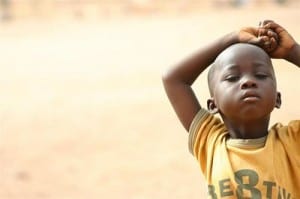Odette in Burkina Faso: “Would You Please Pray?”
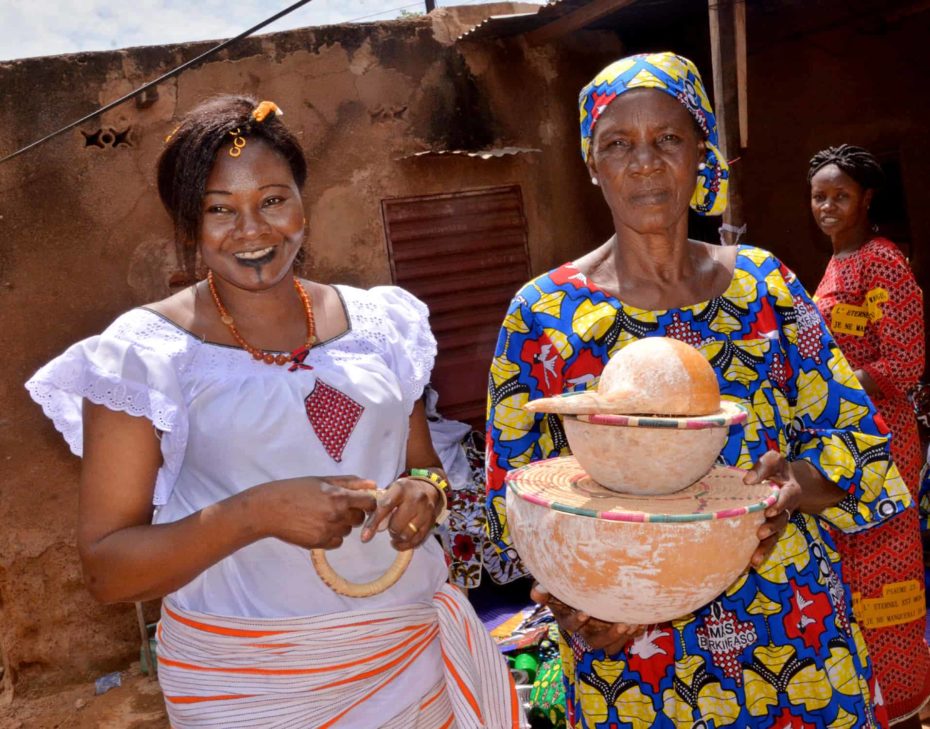
This month, I want you to meet Odette, a supervisor in our Compassion Burkina Faso office. Odette shared about her own childhood, growing up in rural Burkina Faso in a large family that struggled in desperate poverty … I was touched by her story, and as a sponsor, I was incredibly moved by the way she compares the staff in Compassion Burkina Faso with the love of her amazing mother.
Continue Reading ›An Easter Message of Hope
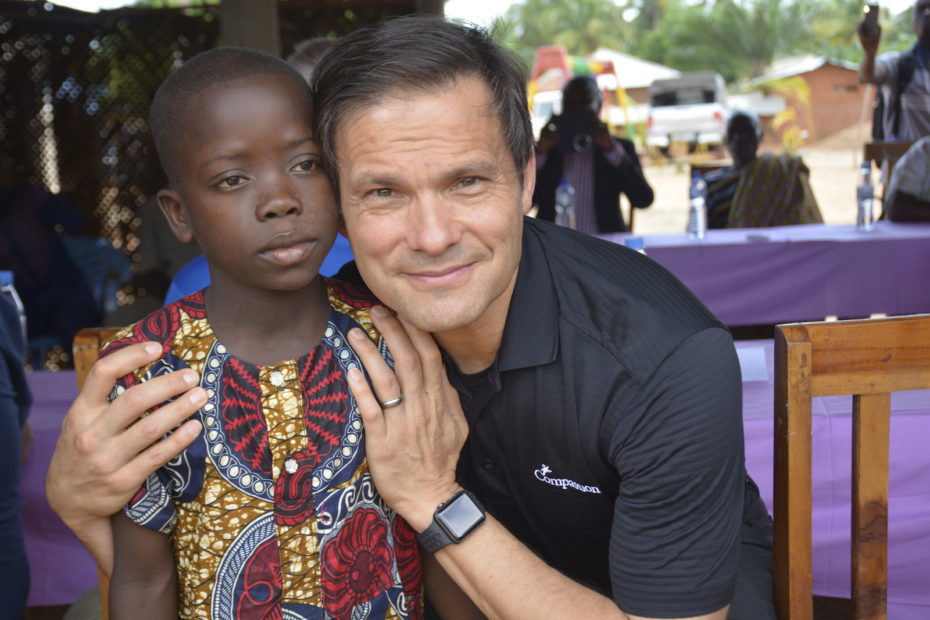
Hope is a fragile but powerful force. When you have hope, no challenge seems too great. When you don’t, even the smallest task becomes overwhelming. But hope in the Lord can truly renew our strength. Be inspired by this Easter message of hope from our President and CEO!
Continue Reading ›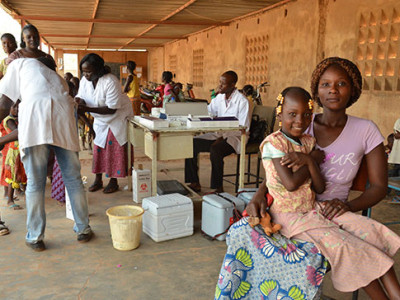
Fear, Ebola and Me
“Are you sure you want to travel there right now? Couldn’t you get… Ebola?” My friend hesitantly asked me this question before my recent trip to Uganda, in Eastern Africa. I found a map and showed my well-meaning friend the actual distance from the epicenter of the Ebola outbreak to Uganda. It’s about 4500 miles, which is well over the distance from California to New York.
Introducing a Future Minister of Defense for Burkina Faso
Twelve-year-old Fadilatou is one of the top five scholars of her age in all of Burkina Faso. She is the youngest child of the family, with six brothers and sisters. Because of her parents’ hospitality, they have received some of their nephews and nieces, along with their children, so the total number of people in the family is 23.
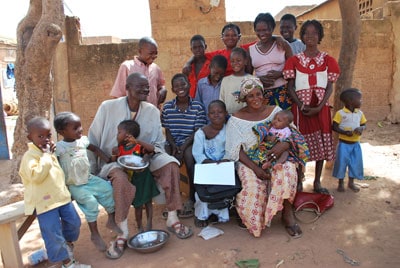
Fadilatou’s father was a driver, but is now too old to work, so he stays at home all day taking care of his grandchildren.
Her mother is a hairdresser and provides food for all the family with her income of less than $2 a day. Sometimes the mother goes to bed without eating, so the rest of the family can share the little food she has gathered.
In 2004 Fadilatou enrolled at the Assemblies of God Patte d’Oie Child Development Center. Her father was not for it because he did not know about the ministry of Compassion, but her mother insisted and convinced him to allow the girl to be part of the program.
Since she joined, Fadilatou has been the top pupil in class. She dreams of going to a military academy next year. “I would like to become minister of defense of the country,” Fadilatou tells her parents.
What Does Child Sponsorship Mean in Burkina Faso?
Pastor Korogo has been a pastor since 2002. He officiates as junior pastor in the central church of the Assemblies of God Church of Ziniaré, 30 kilometers from Ouagadougou, the capital of Burkina Faso.
In 2008, when the church began partnering with Compassion, Pastor Korogo was recruited as child development center director because of his long-standing experience in the ministry among the children of his church.
The development center has 220 registered children who take part regularly in center activities. Like all the other centers in the country, it is located in an area where poverty is visible in people’s daily lives.
The great majority of the population does not have access to drinking water or electricity. When someone in these families falls ill, he is cared for with indigenous methods, as families can’t afford medical care or drugs at the pharmacy.
The child development center is located in a community that is nearly 70 percent Islamic. The largest mosque in the city is 10 meters from the church that shelters the center. This proximity sometimes makes it difficult for Muslim children to effectively take part in the center activities.
AIDS Crisis in Africa: What Compassion Ghana Is Doing About It
Compassion Ghana is intensifying its fight against the spread of HIV and AIDS with Compassion’s AIDS Initiative. Among the many activities aimed at achieving this objective is education.
Florence Sena Amponsah is a Partnership Facilitator for 12 Compassion-assisted child development centers. She has been with Compassion Ghana for one year now. She is involved with a pilot program to train youths to educate their peers about HIV and AIDS.
“When children get to a certain age, around the teenage years, they tend to relate more to their peers and their siblings who are closer to them in age than they would from their parents or teachers or adults in general.
“Parents and adults have the inclination to be uncommunicative on issues concerning sex, but children get to an age where they need answers to many things happening to their bodies. When they do not get the responses they require, they turn to their peers for information.
“Most times the information shared among peers is by and large wrong and detrimental.
“Considering these facts, we believe that when the capacity of children whom we call ‘Peer Educators’ is built up by equipping then with right knowledge and correct information, then these children can carry the message across to other children, their communities, their churches and even in their schools.
“What they are learning are most of the general things they need answers to at their developmental stage, which they are not able to openly talk about.
“The Peer Educators Training is in the pilot phase for 12 child development centers, presenting two children from each. So there are 24 children involved in the pilot.
“From what I have seen so far, I can confidently say that the program is going to make a great impact. The group of children here are highly intelligent, and judging from their participation, I can tell they are learning a lot as they find the topics to be relevant to them.
“We chose HIV and AIDS as the topic for the peer educators because HIV and AIDS is a disease which is threatening Africa. It has cut across many countries, and is a problem here in Ghana.
“We have orphans, we have people who have been infected with the disease, so we are building the capacity of these peer educators to carry the message.
“They are being taught how the disease is spread so that if they know, they will make informed decisions about themselves. At least they will know how to protect themselves.
“They are also being taught the need to care for other people who have the disease to help prevent discrimination, isolation and rejection.”
AIDS Crisis in Africa: Living HIV-Positive
My name is Azalea*. I live with my daughter. She is 10, in grade four and is second in her class. So, we are two people in the family. My husband passed away several years ago after a short disease. He was suffering from a liver problem.
We eat rice, millet pastry and beans. As we are only two, I cook once a day. After breakfast, I cook and we eat the meal at noon, and in the evening I reheat the leftovers and we eat.
We are living in an urban area. We have electricity and running water in the community, but only for those who can afford it. We also have a medical center in the neighborhood. Most people sell small items to feed their families.
I discovered my daughter was HIV-positive in 2005. She was suffering from severe chickenpox. The treating doctor suggested us to take an AIDS test. We agreed, and the child was declared HIV-positive.
I do not know how she got the disease, if it was during her birth or during the blood transfusion she got when she was very little.
My daughter does not yet know she is HIV-positive, but I will surely tell her. As I do not know how she will react, I am looking for the right moment to tell her.
I am also HIV-positive, but I do not know how and when I got infected. When the doctor discovered that my daughter was HIV-positive, he encouraged me to take the test and that was how I came to know.
I was very shocked when I found out. I was asking myself how I would live with the disease and how others would react.
Four years after being declared HIV-positive, I am still asking myself the same questions. (more…)
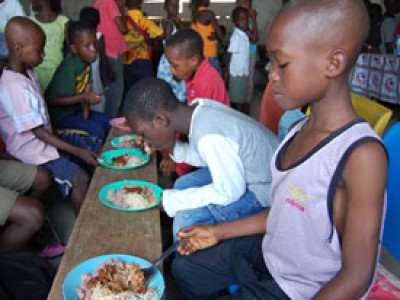
Highly Vulnerable Children: How Do We Help Them?
Our Highly Vulnerable Children initiative deals with poor children who find themselves in very critical conditions demanding special attention and assistance in order to survive.
From the Outside Looking In
Back in May I published a photo and asked you to give it a caption. I also included a little context from the photographer.
“Along the wall outside the Compassion project, many children watched and waited while the other children played and sang. With hundreds and thousands of children needing the hope that Compassion brings, our hearts broke to see the ones that could not be helped. Hundreds more are waiting for their chance to be sponsored, to be given hope, to be shown the love of Christ.” — scfish7
Then recently, I received the following e-mail.
“I read the blog about the children who are registered who are able to sing and enjoy meals while the unregistered ones just stare at them, wishing they were one of them. I have a hard time imagining what this is like.
“Is it like there is a ‘Century Fence,’ so to speak, that separates these two groups, where the unregistered look in and feel sad as they watch the sponsored eat hot meals and be carefree?
“Does this make them feel more unloved?
“Is it appropriate to send a picture or have one on this Web site so I can see what you are talking about? I have a hard time understanding this and maybe a picture would help.”
What are your thoughts? What do the children on the outside looking in feel?
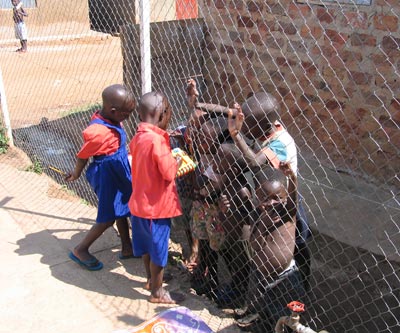
Day of the African Child
Today is the Day of the African Child. Not a well known day for most, but an important day for the children of Africa who this day celebrates and remembers.
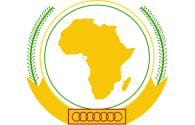 The African child is a resilient one, as many on the African continent must gather up great energy each day just to survive. The constant onslaught of risks and dangers that they face is more than many of us can imagine and more than any child should bear. HIV, AIDS, malaria, diarrhea, malnutrition…..just a few of the barriers that these children must overcome to live healthy and fulfilling lives.
The African child is a resilient one, as many on the African continent must gather up great energy each day just to survive. The constant onslaught of risks and dangers that they face is more than many of us can imagine and more than any child should bear. HIV, AIDS, malaria, diarrhea, malnutrition…..just a few of the barriers that these children must overcome to live healthy and fulfilling lives.
After having spent a good deal of time living and traveling to Africa, I have been amazed and incredibly blessed by being around these children. They have taught me more than any textbook could, and have given me strength when I needed it most.
Here’s to the millions of children in Africa that could use our prayers and support as they continue to face the harshest of environments.
Let’s commit to remembering them and praying for the continued success of this ministry that seeks to serve them and bring them out of their poverty.
From One Child to 1 Million Children
One Million Children Sponsored
I am overwhelmed with gratitude as I write this. Today, as we do every day, we have the privilege of acting as a bridge between caring sponsors and children in need.
However, this particular day we have a sponsorship that is very special in that it represents a milestone for our ministry. Compassion is currently serving 1 million sponsored children! One million!!
I wish we could all be together today to celebrate this joyous moment. What a day it is!
Thank you sponsors! Thank you for your love of children. Thank you for your faithfulness to God’s call on your lives.
I love you, and I love serving the Lord with you through this amazing ministry!
Updated at 4:30 p.m. MDT
“Look at the nations and watch – and be utterly amazed. For I am going to do something in your days that you would not believe, even if you were told.” – Habakkuk 1:5 (NIV)
Tune into Fox and Friends tomorrow (May 21) at 6:50 a.m. EDT to “meet” our 1 millionth child and his sponsor.
The newly sponsored child lives with his father outside Togo’s capital city of Lomé. Togo, a country whose population is seriously affected by the devastation of AIDS, is the most recent country to join the growing list of nations where Compassion works.
The child’s sponsor is from South Korea, the country in which Compassion began its mission 57 years earlier. The sponsor is most recently noted for a gold medal she won at last year’s Beijing Olympics.

